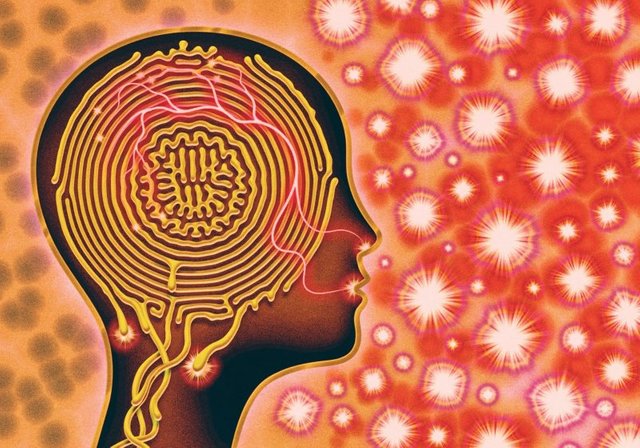Brain and nervous complications that can occur with Kovid-19 infection
About six months have passed since the outbreak of Covid-19. Yet there is no end to the coronavirus. Respiratory complications are considered to be the main cause of the virus, but at present, its serious effects on the kidneys, liver, heart and many other parts of the body are not escaping the attention of researchers or doctors.
So far, more than 300 studies from around the world have looked at how coronavirus attacks can cause brain and neurological complications.Evidence of this is found in the medical records of those who have recovered or are recovering, just as they have seen brain disease in the case of critically ill patients. The greater the risk of respiratory complications, the greater the risk of neurological damage. In many cases, infected patients are only showing signs of neurological illness, not sneezing-coughing or other symptoms.
The effects of coronavirus on the brain and nerves so far can be broadly described as delirium or encephalopathy, encephalitis, blood clotting, nerve damage or Guillain-Barré syndrome. Roughly similar patterns have been observed in various detailed reports. Let's learn a little bit about this.
*What is actually happening inside the brain in the attack of corona?
Delirium is a condition in which your brain is disturbed by a sudden change in the brain. It is more common when taking alcohol, after certain surgeries, or in people with dementia. ‘Encephalopathy is also a condition in which a change in your body causes a change in the functioning of the brain, and you start behaving differently than usual.
Many patients with Covid-19 have been shown to be unable to think, concentrate, or forget a lot of things. In most cases, such changes are short-lived, but it is not yet clear whether they will have a long-term effect after recovery.
Encephalitis is an acute inflammation of the brain. In most cases, it is caused by a virus, or if our immune system mistakenly attacks the brain tissue, it also causes inflammation in the brain.
Researchers blame two factors for these complications in the brain. One is the lack of oxygen in the brain or blood, the other is the storm of cytokines.When the whole body's immune system and antibodies combine to fight the virus, the inflammatory process that goes on is basically a cytokine storm. As a result, or any other unknown process may be responsible for causing inflammation in the brain.
The arteries that carry blood to our brains have been found to block blood flow to the arteries, in many patients with covidosis.In some cases, small amounts of hemorrhage have been found in blood vessels that have become weakened due to inflammation. One study found small bleeding spots in the deepest part of an infected patient's brain, such as in deep-sea divers or in altitude sickness. This blood clot in the brain can push you towards stroke, although there are many more risk factors associated with stroke, such as high blood pressure, diabetes, heart disease, obesity, etc.
Another mystery that occurs in Kovid's brain is called 'Happy Hypoxia'. When the saturation level or partial pressure of oxygen in your blood is lower than normal, it is called hypoxemia. This can lead to shortness of breath or loss of consciousness at first and, if continued, can lead to gradual organ damage, paralysis, and even death. The normal saturation level of oxygen in our blood is 98 percent or so.
But in the case of many Kovid patients, even if this level drops to 60 percent, even 70 percent, it is found that the message has not reached their brain, meaning that they were fully active and cognitively functional.
Now let's come to Gulaine-Barre syndrome. It has been said a while ago that our immune system can get lost and attack our body cells by mistake. And if it attacks our healthy neural network or nervous system, then the problem is Guillain-Barr syndrome.A small number of covid patients have been diagnosed with this syndrome, where the myelin fibers in their brain have been severely damaged. This can lead to weakness, pain, or even paralysis in severe cases.
